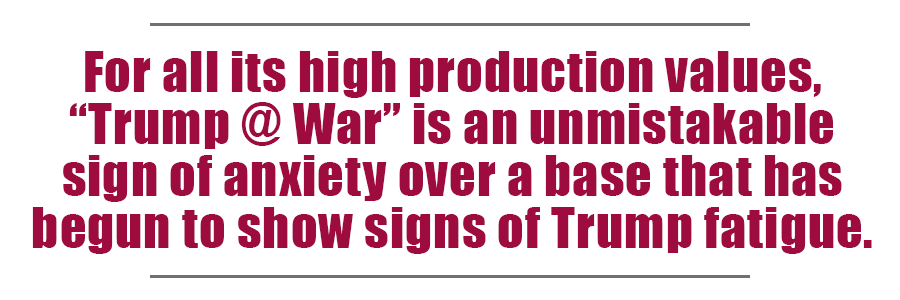Bannon’s ‘Trump @ War’ is a call to arms to keep Congress safe from Democrats

WASHINGTON — “This film is not subtle,” Steve Bannon says, sitting in the ornately wallpapered dining room of the Capitol Hill townhouse known as the “Breitbart Embassy.” The term pays homage to the conservative website that Bannon made central to the 2016 presidential election and from whose chairmanship he was expelled in January after a public falling-out with the man he helped win that election.
The unsubtle film in question, “Trump @ War,” is Bannon’s latest effort to keep Trump in the Oval Office — and himself at the volcanic core of national affairs. Directed by Bannon and featuring cameos by longtime Trump allies like Corey Lewandowski, his first campaign manager, and Michael Caputo, another close adviser, “Trump @ War” is an expertly produced, 70-minute campaign commercial, one that recounts Trump’s greatest hits, from tax cuts to North Korea, while taking every opportunity to troll the forces of the anti-Trump resistance. A glistening slab of red meat, it makes no effort to convert anyone. As for nuance? That, like the best steak, is rare.
Bannon says he will screen the film as a way to get out the vote in November, when the Democrats are projected to retake the House of Representatives. Some say they could even make a credible bid for control of the Senate. To keep that from happening, GOP voters will have to show the same enthusiasm for congressional candidates that they did for Trump. They haven’t so far, which has Bannon worried. “There’s a sense of complacency” among Trump supporters, he says. “They don’t see the threat of losing the House.”
The film is being distributed online by Western Journal, a conservative media company.

In defiance of House Speaker Tip O’Neill’s famous maxim that all politics is local, Bannon says he wants to “nationalize this election,” to make it about the flaxen-haired elephant in every room. That’s a risky strategy, considering Trump’s slipping popularity with independent voters, only 36 percent of whom approve of the job he is doing, according to polling by Gallup. But among Republicans, his popularity stands at 85 percent.
That could help a struggling candidate like Rep. Steve Chabot, who has represented the Cincinnati area for 11 terms in the House but now faces a difficult race against young Democratic challenger Aftab Pureval. Then there is Dana Rohrabacher, who got his start in politics playing for a pro-Goldwater folk band during the 1964 election. His Orange County seat, once seen as safe as a forecast of sun in Southern California, is also in peril, as Democrats motivated by fury at Trump look to make gains anywhere and everywhere. There are now swing districts in Kentucky and Kansas. Actually, make that two swing districts in Kansas.
“This is not a persuasion election,” Bannon says. “This is all about getting your base out.” To that end, he says he now runs “a very sophisticated war room” whose planning sessions include some two dozen individuals. Among them is Sam Nunberg, the early Trump aide who supposedly came up with the border wall idea, and Patrick Caddell, President Jimmy Carter’s onetime pollster. “We run the only war room that’s out there” backing the Trump agenda, Bannon says. (The claim is difficult to confirm, given the number of pro-Trump groups of varying size outside the White House.)
A year after he left the White House and eight months since his impolitic comments to “Fire and Fury” author Michael Wolff became public, enraging Trump, Bannon has cast himself as an independent player working on the White House’s behalf. But he has remained well outside the White House orbit, or for that matter, the broader orbit of the Republican Party. “Trump @ War” is an independent documentary, produced and released without Trump’s involvement. And while Bannon praises White House political director Bill Stepien’s “flawless” midterm strategy, he says the two are not in coordination. The film is being screened for conservative online outlets like One America News and Conservative Review’s CRTV. But for Bannon, it’s more important that “Trump @ War” be screened in “church basements, union halls, civic centers” in the 15 to 20 House districts that polling experts believe will determine the chamber’s makeup come next January.

For all its high production values, “Trump @ War” is an unmistakable sign of anxiety over a base that has begun to show signs of Trump fatigue. Bannon wants them “totally jacked up,” ready to vote as well as actively campaign in their communities for Republican candidates. Perhaps that’s why the film opens by bashing some of conservatives’ favorite targets, including CNN’s Don Lemon, MSNBC’s Rachel Maddow and antifa, the black-clad leftists who have not infrequently resorted to violence in the last two years. Your vote for the GOP, the movie seems to say, is not only also a vote for Trump but a vote against all the forces — journalists, anarchists, vegetarians, Californians — allegedly conspiring to keep America from becoming great again.
Trump has mocked the notion of a Democratic landslide, predicting a “red wave” instead. Bannon, though, is remarkably frank about the lack of enthusiasm among conservatives. And he is just as open about his envy of progressives, who are organized and energized. “They do understand the stakes,” he says of his enemies. “They understand that Trump is in their personal life 20 or 30 years from now unless they stop this program. They’ve gotta stop Trump in November. You don’t need to tell the left the stakes, you don’t need to tell them the urgency. They’re woke.”
Bannon in particular evinces admiration for Alexandria Ocasio-Cortez, the Bronx-bred democratic socialist who upset incumbent Joe Crowley in a Democratic primary over the summer. “The presidential guys in the Democratic Party ought to be very glad she’s 28 years old, not 35. She’s got something you can’t coach,” he says, before adding that Ocasio-Cortez knows little and is wrong about what little she does know. He also has kind words for Rep. Beto O’Rourke, the House member from Texas who is within just four points of Ted Cruz in perhaps the most surprisingly tight Senate race in the country. “I’m impressed by the campaign he’s running,” Bannon says of O’Rourke, who has been barn-storming the Lone State state for months. “It’s relentless.”
In the face of a concerted liberal attack, the particulars of who the Republican candidates are and what they stand for are almost immaterial for Bannon. Whoever they are, he needs the Trump base to vote for them. “There may be a RINO in your district, and it doesn’t matter,” Bannon says, using the acronym for “Republican in name only,” a pejorative deployed by some on the right to describe insufficiently conservative members of the party. “You have to get over that.”
This is a marked departure for Bannon, who not long ago placed a higher value on taking principled ideological positions than looking for political wins. In the fall of 2017, he promised a “season of war” on Republican members of the Senate, including Dean Heller of Nevada. But that effort ended in disaster, with Bannon supporting profoundly controversial judge Roy Moore for a Senate seat in Alabama over Republican incumbent Luther Strange, for whom Trump tepidly campaigned. Moore won the primary but lost in the general election to Doug Jones, a milquetoast liberal who returned the seat to Democratic control for the first time in decades. Even though Bannon offered no apology for the loss, many saw Alabama as signifying how destructive he had become.
Embarrassing as the Alabama defeat was, it didn’t alter the balance of power in the Senate. The House is in much greater flux, however. Should Democrats gain control of the lower chamber, they will launch a cavalcade of congressional investigations while moving to impeach Trump. That will render Trump, Bannon believes, as powerless as Bill Clinton in the second half of his second term, when the investigation into his relationship with intern Monica Lewinsky made him largely powerless.
“If you want to stop the Trump program, let Nancy Pelosi take the House of Representatives,” Bannon says, referring to the House Democratic leader. “I don’t wanna hear about 2020; 2020 doesn’t exist,” he says, depicting the November midterms as a kind of Stalingrad, the crucial World War II battle that turned the tide against Germany. He was encouraged to see President Obama entering the fray earlier this month, which he says is a “tell” that the Democrats aren’t confident about their prospects.

And just as the Republican Party’s fortunes have fluctuated in the past year, so have Bannon’s own. He has in part shifted his focus to Europe, where association with leaders like Viktor Orbán, the nationalist prime minister of Hungary, and Matteo Salvini, the Italian interior minister, have led to concerns that Bannon is attempting to foment a far-right revolution on the continent. He denies such charges and says he is committed to rooting out European anti-Semitism, for which he blames not his populist right-wing allies but “cultural Marxists” (which Bannon struggles to define) like Jeremy Corbyn, leader of the U.K. Labour Party.
Things are no less complicated back home, where the 64-year-old self-styled disruptor remains an object of fascination and revulsion, mockery and fear. Errol Morris, the celebrated documentarian, has recently premiered a documentary about Bannon, “American Dharma,” which has been slammed by Bannon critics for giving his dangerous views another mainstream platform. News that he would be interviewed at the New Yorker’s annual festival by the magazine’s editor, David Remnick, met with such vehement resistance that the event was canceled. Bannon called the rescinding of the invitation “gutless,” even as others debated the usual, difficult-to-answer questions about his influence, his relevance, and his convictions — besides that Steve Bannon matters, because Steve Bannon is right.
On the point of his own own relevance, Bannon is unambiguous. He asks who in Washington has been working harder on Trump’s behalf. Getting no answer, he asks again. The prolonged silence seems to satisfy him.
“I don’t really know,” Bannon says, “who else is relevant, to be honest.”
_____
Read more from Yahoo News:



